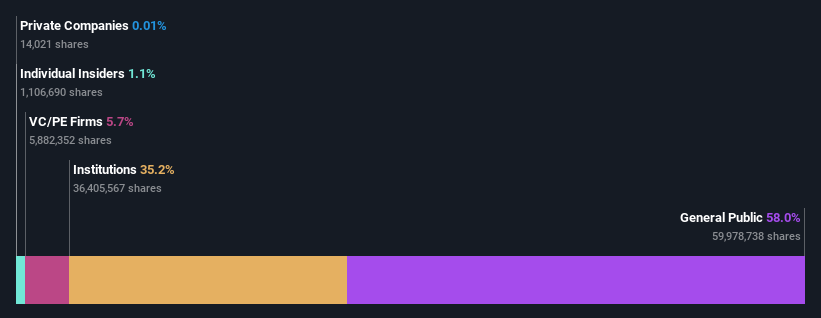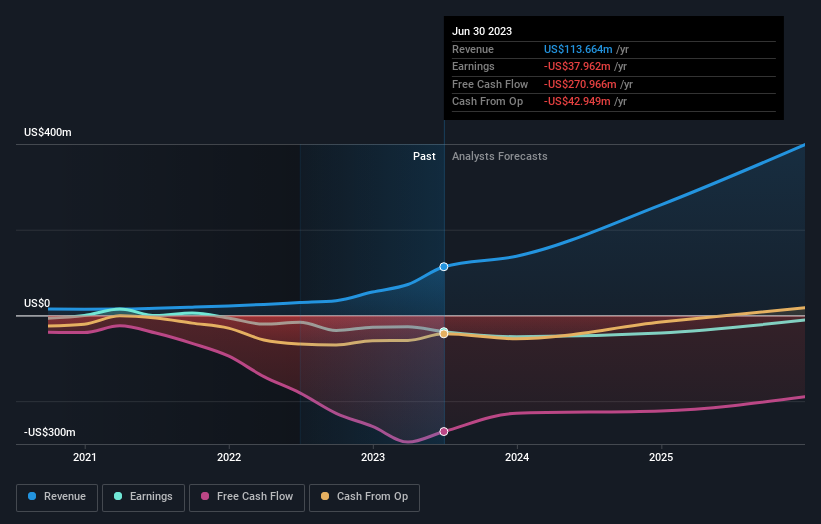EVgo, Inc.'s (NASDAQ:EVGO) market cap touched US$1.6b last week, benefiting both individual investors who own 58% as well as institutions
Key Insights
EVgo's significant individual investors ownership suggests that the key decisions are influenced by shareholders from the larger public
A total of 25 investors have a majority stake in the company with 35% ownership
To get a sense of who is truly in control of EVgo, Inc. (NASDAQ:EVGO), it is important to understand the ownership structure of the business. We can see that individual investors own the lion's share in the company with 58% ownership. Put another way, the group faces the maximum upside potential (or downside risk).
While individual investors were the group that benefitted the most from last week’s US$96m market cap gain, institutions too had a 35% share in those profits.
Let's take a closer look to see what the different types of shareholders can tell us about EVgo.
Check out our latest analysis for EVgo
What Does The Institutional Ownership Tell Us About EVgo?
Institutional investors commonly compare their own returns to the returns of a commonly followed index. So they generally do consider buying larger companies that are included in the relevant benchmark index.
EVgo already has institutions on the share registry. Indeed, they own a respectable stake in the company. This implies the analysts working for those institutions have looked at the stock and they like it. But just like anyone else, they could be wrong. It is not uncommon to see a big share price drop if two large institutional investors try to sell out of a stock at the same time. So it is worth checking the past earnings trajectory of EVgo, (below). Of course, keep in mind that there are other factors to consider, too.
Hedge funds don't have many shares in EVgo. The Vanguard Group, Inc. is currently the largest shareholder, with 6.3% of shares outstanding. For context, the second largest shareholder holds about 5.7% of the shares outstanding, followed by an ownership of 4.9% by the third-largest shareholder.
Our studies suggest that the top 25 shareholders collectively control less than half of the company's shares, meaning that the company's shares are widely disseminated and there is no dominant shareholder.
While studying institutional ownership for a company can add value to your research, it is also a good practice to research analyst recommendations to get a deeper understand of a stock's expected performance. There are plenty of analysts covering the stock, so it might be worth seeing what they are forecasting, too.
Insider Ownership Of EVgo
The definition of company insiders can be subjective and does vary between jurisdictions. Our data reflects individual insiders, capturing board members at the very least. The company management answer to the board and the latter should represent the interests of shareholders. Notably, sometimes top-level managers are on the board themselves.
Insider ownership is positive when it signals leadership are thinking like the true owners of the company. However, high insider ownership can also give immense power to a small group within the company. This can be negative in some circumstances.
Our most recent data indicates that insiders own some shares in EVgo, Inc.. It is a pretty big company, so it is generally a positive to see some potentially meaningful alignment. In this case, they own around US$17m worth of shares (at current prices). It is good to see this level of investment by insiders. You can check here to see if those insiders have been buying recently.
General Public Ownership
The general public, mostly comprising of individual investors, collectively holds 58% of EVgo shares. This level of ownership gives investors from the wider public some power to sway key policy decisions such as board composition, executive compensation, and the dividend payout ratio.
Private Equity Ownership
Private equity firms hold a 5.7% stake in EVgo. This suggests they can be influential in key policy decisions. Some investors might be encouraged by this, since private equity are sometimes able to encourage strategies that help the market see the value in the company. Alternatively, those holders might be exiting the investment after taking it public.
Next Steps:
It's always worth thinking about the different groups who own shares in a company. But to understand EVgo better, we need to consider many other factors. Consider for instance, the ever-present spectre of investment risk. We've identified 4 warning signs with EVgo , and understanding them should be part of your investment process.
If you are like me, you may want to think about whether this company will grow or shrink. Luckily, you can check this free report showing analyst forecasts for its future.
NB: Figures in this article are calculated using data from the last twelve months, which refer to the 12-month period ending on the last date of the month the financial statement is dated. This may not be consistent with full year annual report figures.
Have feedback on this article? Concerned about the content? Get in touch with us directly. Alternatively, email editorial-team (at) simplywallst.com.
This article by Simply Wall St is general in nature. We provide commentary based on historical data and analyst forecasts only using an unbiased methodology and our articles are not intended to be financial advice. It does not constitute a recommendation to buy or sell any stock, and does not take account of your objectives, or your financial situation. We aim to bring you long-term focused analysis driven by fundamental data. Note that our analysis may not factor in the latest price-sensitive company announcements or qualitative material. Simply Wall St has no position in any stocks mentioned.


